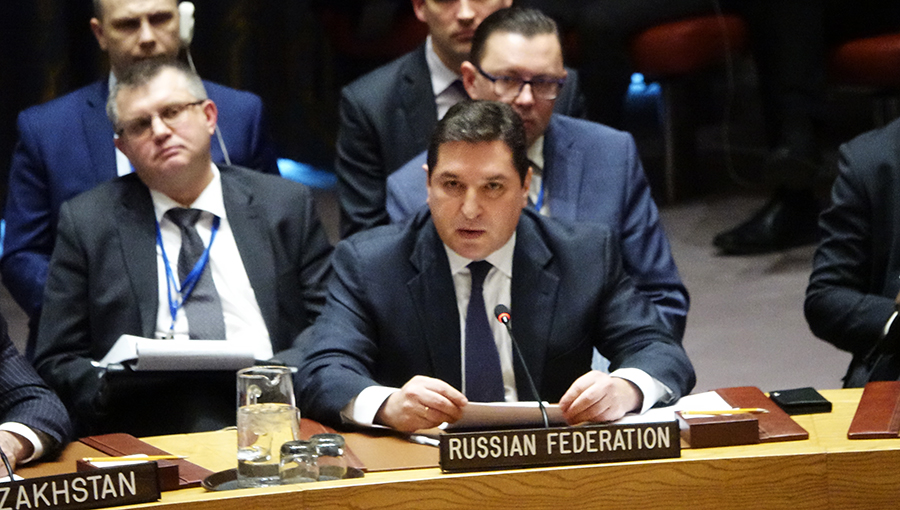Statement by Deputy Permanent Representative of the Russian Federation to the United Nations, Mr. Vladimir Safronkov, at the Secutiry Council meeting on the DPRK
The Russian Federation understands the critical importance of halting Pyongyang’s nuclear and missile programmes, which are unacceptable to us.
The launch of ballistic missiles without warning from North Korean territory poses tremendous risks to maritime and air transit in the region and a serious threat to the lives of ordinary civilians. Such activity must stop immediately. Notwithstanding, Russia calls on that all parties remain open to genuine political dialogue.
We once again reject the methodology underlying the adoption of resolution 2397 (2017) on the Democratic People’s Republic of Korea introduced by the United States. Many hours are spent in the United Nations and the Security Council in discussions, and hundreds of documents are drafted in consideration of the importance of crafting realistic and implementable decisions that reflect the political concerns and mutual responsibilities of the parties.
When we addressed the specific country situation in this case, such standards were overlooked. Consequently, the agreement reached comprises with artificial timetables while the wording was amended only minutes before the voting. The adoption of resolution 2397 (2017) was made possible solely thanks to the fact that our concerns were reflected and taken into consideration, although unfortunately this occurred only at the very last minute and at enormous effort.
We stress that sanctions-based measures do not apply to the activities of diplomatic missions in the Democratic People’s Republic of Korea, the projects they undertake with the regime, restrictions on Korean civilian aircraft, or the provision of the relevant spare parts. Turning to the last-minute insertion in paragraph 8 concerning the 24-month period for the repatriation of North Korean workers, that is the minimum acceptable time frame necessary to address the logistical aspects of the issue.
Unfortunately, our call on stakeholders to avoid further escalation of tensions and to revise the policy of mutual intimidation was not heeded. We proposed reasonable and realistic alternatives to the ultimatumbased logic of sanctions. That has implications for the implementation not only of the sanctions provisions of resolution 2397 (2017), but also of those calling for a peaceful, diplomatic and political settlement to the situation through dialogue and talks, as well as those provisions of all Security Council resolutions on the Democratic People’s Republic of Korea, without exception.
Such disregard constitutes a breach of the consensus-based agreements reached on the Council. Unity is of course important, but unity is important with regard not only to favouring sanctions, but also with to supporting a political settlement. We stress once again that the normalization of the situation on the Korean peninsula requires an approach that demands both the cessation of nuclear missile tests by the Democratic People’s Republic of Korea and an end to the build-up of military infrastructure and the downsizing of manoeuvres.
We must urgently create an atmosphere of trust among States in the region. It is important that both parties abandon obsolete formulas for addressing the nuclear issue on the Korean peninsula that have proven to be ineffective, and to resolve the situation through creative approaches. Isolation and pressure must be supplanted by dialogue and talks.
We call on the stakeholders once again to promptly undertake practical measures aimed at de-escalating tensions. Russia stands ready to promote such efforts and is already doing so. We are in a position to closely engage with all partners so as to expeditiously address the host of issues on the Korean peninsula through the only possible avenues, namely, mutually respectful dialogue in a political and diplomatic format. That is the specific goal of the Russian-Chinese road map for resolving the issue, which remains a practical proposal at our disposal.
We note the approach of the Secretary-General for arriving at a political settlement to the problems on the Korean peninsula. We advocate the development of dialogue between the United Nations and the Democratic People’s Republic of Korea. Momentum to that end was achieved by the political mission led by Under-Secretary-General Feltman to Pyongyang. It must be based upon a robust humanitarian track to assist the 25 million people who are truly in need of assistance.
Urgent measures must be taken to engage in political dialogue so as to avoid catastrophic scenarios that could trigger horrific repercussions. The military option is not viable. We are all duty-bound to provide opportunities for diplomacy.
